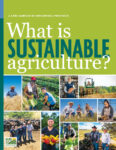
What is Sustainable Agriculture?
This award-winning report provides a sampler of best practices in sustainable agriculture—from marketing and community vitality to cover crops and grazing—as well as eight profiles of producers, educators and researchers who have successfully implemented them.
Congressional definition
As defined by Congress, sustainable agriculture is an integrated system of plant and animal production practices having a site-specific application that will, over the long term:
- Satisfy human food and fiber needs
- Enhance environmental quality and the natural resource base upon which the agricultural economy depends
- Make the most efficient use of nonrenewable resources and on-farm resources and integrate, where appropriate, natural biological cycles and controls
- Sustain the economic viability of farm operations
- Enhance the quality of life for farmers and society as a whole
Additional points
We can add to this by saying that sustainable agriculture is economically viable. If it is not profitable, it is not sustainable.
Sustainable agriculture is ecologically sound. We recognize that we must preserve the resource base that sustains us all.
Sustainable agriculture is socially supportive. A premise of sustainability is that the quality of life of farmers, farm families, and their communities is important.
Sustainable agriculture is a holistic approach to farming, and is an integral part of pest management, cultural practices, soil health, and long-term farm viability.